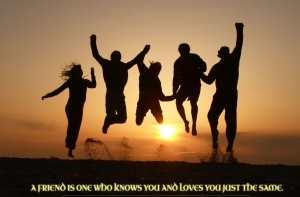She’s not at all an unpleasant woman. Not as far as I’ve seen, and nor does anyone mention they’ve found her difficult. A bit grumpy at times, but then this is not the life she had imagined. Perhaps a bit judgemental, not really willing or able to see that nobody else wanted to be there either. Doesn’t participate in group activities, seems to sneer slightly at the art and craft workshops. But pleasant enough, a nice smile, easy to chat to.
So how can it be? How can someone reach their sixties, and be completely alone in the world? My innocent question as to whether she uses Facebook (as so many homeless people do), later seemed at best unthinking, at worst a tad callous. Facebook, fundamentally is all about friends. Keeping in touch, sharing photos, describing good days and bad days, communicating with friends. I wanted to bite back the question, but it was too late. Later, as we got to know each other a bit better, it slipped out – she has no friends. Not one. Not in the UK (she is British) nor in Spain, where she has lived for twenty years in a town not far from Málaga. So no, she doesn’t use Facebook. Facebook is not about you, it is about your friends and your networks and keeping in touch.
too late. Later, as we got to know each other a bit better, it slipped out – she has no friends. Not one. Not in the UK (she is British) nor in Spain, where she has lived for twenty years in a town not far from Málaga. So no, she doesn’t use Facebook. Facebook is not about you, it is about your friends and your networks and keeping in touch.
We walked seven kilometres together that day. From the city homelessness shelter, in to the centre to visit a branch of her bank. She hadn’t been there for years. Not to her own branch, not to any branch. The absence of any ID documents stalled us. The bank could do nothing without a passport. I bought her a bacon roll and a coffee and we planned the next steps. Clearly she needed to go to the British Consulate to organise a passport. She looked a bit worried. She seems a capable woman – up to a point. I glanced at my watch. “Shall we go now?” I offered. We drained our coffee and set off back across to the other side of Málaga’s dry river. The sat nav on my phone guided us there, until up on the first floor I had to hand it in nervously to security before we could go in.
next steps. Clearly she needed to go to the British Consulate to organise a passport. She looked a bit worried. She seems a capable woman – up to a point. I glanced at my watch. “Shall we go now?” I offered. We drained our coffee and set off back across to the other side of Málaga’s dry river. The sat nav on my phone guided us there, until up on the first floor I had to hand it in nervously to security before we could go in.
Whether staff, like the wonderful team at RAÍS Fundación, working at the day centre beside the city-run shelter, or volunteers like me, the one thing we know is that there will always be things we don’t know. There is a  sort of reason she doesn’t have a passport. Just as there is a sort of reason why she was on the streets. There’s a sort of reason she never went to her bank. There’s a sort of reason why she has not one single bit of official identification. And, I suppose, there’s a sort of reason why she has no friends. Some of the pieces of the jigsaw may become clearer, may fit into place. But I suspect, like that jigsaw you buy at a charity shop, there will always be a couple of pieces missing, and the picture will never be complete.
sort of reason she doesn’t have a passport. Just as there is a sort of reason why she was on the streets. There’s a sort of reason she never went to her bank. There’s a sort of reason why she has not one single bit of official identification. And, I suppose, there’s a sort of reason why she has no friends. Some of the pieces of the jigsaw may become clearer, may fit into place. But I suspect, like that jigsaw you buy at a charity shop, there will always be a couple of pieces missing, and the picture will never be complete.
So we do the bits we can, and we lean on the social workers at the shelter to do the bits for which they are responsible. More importantly, we try to help the people in the shelter and the people on the street who come into the day centre, to see the bits that THEY can do, the parts of their lives that THEY can take charge of and be in the driving seat. And most importantly of all, mostly, we do nothing more than be there, and listen, respectfully, giving dignity to people often treated as though they were less worthy of respect.
But we can’t truly give friendship. Our role is different. Friendship is one of the greatest gifts there is, because it is given freely, usually reciprocated, and provides a connection, a network, a safety, a comfort. So many things.

So we nudge a few things forward, a couple of steps towards sorting her passport, which in turn should unblock the bank, which in turn should unlock her future. I gave her a bar of soap, just a little hotel freebie, because she had said she didn’t have any. She thanked me for being her friend. I smiled but said nothing. I’m not her friend, I’m her volunteer. She has no friends, not anywhere.
Back at home I turn the phone back on. It erupts with the usual hundred messages, WhatsApps and notifications that came in while it was turned off. A friend arranges a cinema trip. Another suggests lunch. Then, in the street, a neighbour knocks with fresh eggs from her chicken. Another shouts to me that she has just made coffee and asks me to go round. Things we take for granted.
Homelessness. Friendlessness. Loneliness. For most of us, it’s impossible to imagine.
Fortunately.

© Tamara Essex 2016 http://www.twocampos.com